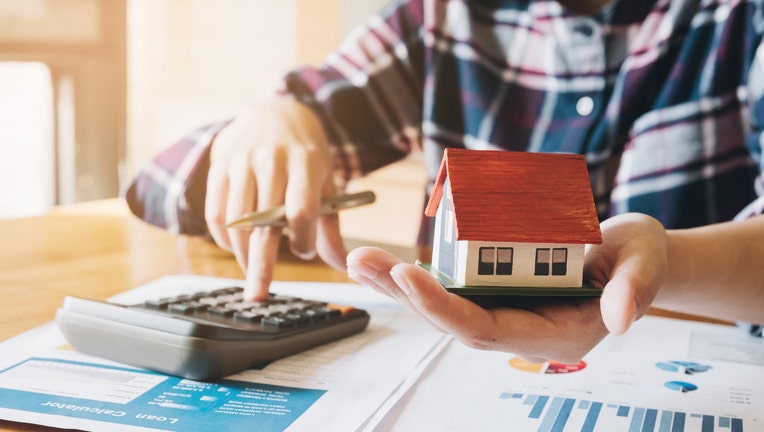How much does mortgage refinancing cost?

Will the savings outweigh the expense? That depends. (iStock)
Refinancing your mortgage allows you to pay off your current mortgage by taking out a new loan. Many homeowners refinance to lock in a lower interest rate, change the terms of their loan or take cash out to use for other purposes like home improvements, or to save money.
While mortgage refinancing interest rates dipped to record lows amid the economic downturn caused by the coronavirus pandemic, they’re inching higher. For homeowners who’ve been thinking about refinancing, now may be the best time to do it.
REFINANCING TO A RECORD-LOW MORTGAGE RATE? HERE'S WHAT TO KNOW
If you’re ready to explore your options and refinance your mortgage, visit Credible to compare mortgage refinance rates and lenders and get a preapproval letter in minutes.
Much like your original mortgage, refinancing involves closing costs. Take a look at the potential cost of refinancing and determine how much it may save you.
How much (approximately) mortgage refinancing costs
Though homeowners typically refinance to lower their monthly payment, there are costs associated with taking a new loan for a home refinance. Expect to pay between 2 and 5% of your new loan amount in closing fees. For example, if your new loan amount is $300,000, your cost to refinance will range from $6,000 to $15,000.
Use an online mortgage calculator to determine potential monthly payments or plug your numbers into Credible and see your estimated mortgage rates and monthly payments.
What fees make up these costs? Take a look.
COULD 2% MORTGAGE RATES BE THE NEW NORMAL?
Line item breakdown
Melissa Cohn, mortgage banker at William Raveis Mortgage, outlines what to expect:
- Application or processing fee: $750-$1,500
- Appraisal: $500 for single family homes valued at $750,000 or less. "The cost goes up as the value of a home increases and if the home is located in an area where comps are not available online," she notes. "Two- to four-unit homes are more expensive to appraise, as well as investment properties, where a rental income analysis is needed along with an appraisal report."
- Credit report: $50-$110
- Bank attorney or settlement agent: $500-$1,500. "The cost depends on the state the home is located in," Cohn states. "If the title company can act as the settlement agent, then the fees are lower. If a bank attorney is required by the state, then the fees are higher, for example."
- Title insurance and recording fees: These are regulated by each state and county. "The cost can be as low as $1,000 and can be several thousands of dollars, depending on the loan," Cohn explains
- Adverse market fee: Effective December 1, 2020, this fee is imposed on refinance lenders by mortgage backers Fannie Mae and Freddie Mac. Homeowners may be expected to absorb some of the refinance cost, notes Nicole Kubin, founder of Strategic Divorce Advisory. Certain refinances are exempt, including those for mortgage loan balances below $125,000. While 0.5% might not seem steep initially, if you’re borrowing $300,000, that fee amounts to $1,500.
- Miscellaneous fees: These could include flood certifications or tax certification and can be several hundred dollars each.
Whether you're interested in lowering your monthly mortgage payments or considering a cash-out home refinance, Credible's free online tool lets you compare today's refinance rates from multiple mortgage lenders.
SHOULD I REFINANCE MY ADJUSTABLE-RATE MORTGAGE NOW?
Ways to get around mortgage refinancing costs
One way to skirt mortgage refinancing costs is to opt for a no-closing-cost refinance. As its name implies, you avoid paying those charges upfront by rolling them into your principal loan amount. Cohn notes that this is a good option if the rate savings is significant.
"On the flip side, you’re adding to your principal loan amount and paying interest on the costs," she says.
Another no-closing-cost refinancing option is to accept a higher interest rate from the loan lender, who’ll use the fees they earn from the higher rate to pay for part of, or all of the mortgage refinance closing cost. Though this doesn’t increase your principal loan amount, you’ll pay more over the life of the loan due to that increased rate. It may also boost your monthly payment, which is what most refinancing homeowners hope to avoid.
The potential savings benefits of a mortgage refinance
To illustrate the potential savings homeowners can enjoy, consider the following example. If your mortgage balance is $300,000 with a 30-year fixed rate of 4%, your monthly payment is $1,432 and your total cost of the mortgage (principal plus interest) comes to $515,609.
HOW TO KNOW IF MORTGAGE REFINANCING IS FOR YOU, ACCORDING TO EXPERTS
If you were to refinance at a fixed rate of 3.25%, your new monthly payment drops to $1,306, and your total cost decreases to $470,023. Though that three-quarters of a percent seems small, over the loan's term, it would save you over $45,000.
Before you begin the refinancing process, determine how long you plan to stay in your home. If you're a first-time home buyer or you might move before you recoup your closing costs, refinancing may not be worthwhile.
Have questions about refinancing? Visit Credible to get in touch with experienced loan officers to have your mortgage refinance questions answered.
Have a finance-related question, but don't know who to ask? Email The Credible Money Expert at moneyexpert@credible.com and your question might be answered by Credible in our Money Expert column.

